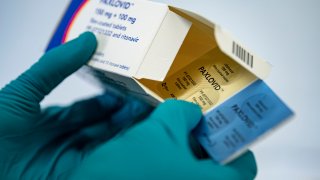
Paxlovid has been in headlines recently as the anti-viral COVID treatment has been used in some high-profile cases, including President Joe Biden, and while the drug has been associated with rare cases of what's known as "COVID rebound," some who received it have also noted another unusual side effect being referred to as "Paxlovid mouth."
According to Rush University Medical Center, "Paxlovid mouth" is often used to refer to a metallic or bitter taste in the mouth shortly after taking the drug.
Shivanjali Shankaran, MD, an infectious disease specialist at RUSH, said about 5.6% of people who took Paxlovid in a study reported changes in the taste of their mouth, or what she called "dysgeusia."
Chicago's top doctor said the unpleasant taste typically disappears "when you finish your course of Paxlovid."
Feeling out of the loop? We'll catch you up on the Chicago news you need to know. Sign up for the weekly Chicago Catch-Up newsletter here.
"So you usually take it for a few days, and then it goes away. It's not long-lasting," Chicago Department of Public Health Commissioner Dr. Allison Arwady said Tuesday. "It's not dangerous, but it can be unpleasant for some people and... if folks are taking Paxlovid, you know, try taking it with some gum or with some mint. Some people also take zinc - they think that that can sometimes help with 'Paxlovid mouth.'"
Arwady said the change is nothing like the loss of taste or smell that can sometimes come with a COVID infection and the two conditions are not related.
"It's just a short-term side effect that about one in 20 people who take Paxlovid can have," she said. "It is not a reason not to take Paxlovid, okay? If you are somebody who is recommended to take Paxlovid, take Paxlovid."
Local
Paxlovid is one of few treatments currently available to fight COVID-19.
Both President Joe Biden and First Lady Jill Biden were prescribed the medication after contracting COVID and later experienced rebound cases of the virus. However, health officials widely assert a rebound case can occur whether or not a person received Paxlovid.
If you recently contracted COVID and believe the treatment may be an option in your case, here's everything you need to know, including how it works, its effectiveness and possible side effects.
How Does the Drug Work?
According to Yale Medicine, a full treatment cycle of Paxlovid is taken over a five-day period, and requires the patient to take a total of 30 pills, or six per day.
A patient needs to take three pills at a time, and does so twice per day.
Two of the pills are a medication known as “nirmatrelvir.” That drug, according to the CDC and Yale, inhibits production of an enzyme that the COVID virus needs to create certain key particles.
The third pill, known as “ritonavir,” helps to boost the effectiveness of the medication by slowing down its metabolism by the liver, thereby allowing it to remain in the body longer.
How Soon Must Paxlovid be Taken?
Similar to Tamiflu, Paxlovid is designed to be taken within the first five days after the onset of symptoms.
Taking it after that point hinders the drug’s effectiveness, according to physicians.
How Effective Is It?
The Illinois Department of Public Health has cited studies that suggest that Paxlovid can reduce the risk of hospitalization by as much as 89%.
According to Yale Medicine, that number comes from studies taken of patients that took the drug within three days of symptom onset.
Who is Eligible for the Treatments?
The FDA has authorized Paxlovid for any individuals that are 12 years of age or older and are at a high risk of severe illness.
Those groups include individuals age 65 and older, or who have underlying conditions like cancer, diabetes, obesity, or others.
A recent change to the EUA also allows state-licensed pharmacists to prescribe the medication, but officials still urge the public to consult with their regular physicians or to visit a test-to-treat site (locations of which can be found here), as pharmacists can only prescribe the medication in limited situations.
Does Paxlovid Work Against Omicron?
According to Pfizer, Paxlovid is effective against omicron variants, including BA.5.
Is COVID Rebound Something That Occurs Primarily With Patients Who Have Taken Paxlovid?
According to multiple studies and governmental reports, a person could potentially experience COVID rebound with or without having taken the Paxlovid antiviral.
According to the CDC, a rebound can occur “independent of treatment with Paxlovid, and regardless of vaccination status.”
While no full-scale studies have been performed, it does appear that those individuals who were previously treated with Paxlovid show “mild illness” from their rebound cases, according to the CDC.
In response to the studies, the Food and Drug Administration has asked Pfizer to test the effects of an additional course of the antiviral in patients experiencing "rebound" cases. The data will be due by Sept. 30 of next year, according to the FDA.
Are Other Options Available?
In the event that Paxlovid is not immediately available, the FDA has also given an EUA for Merck’s Molnupiravir treatment. That treatment is used in more limited situations, and officials only advise patients to use it if Paxlovid isn’t available.
Monoclonal antibody treatments can also be used in patients that are at-risk, or are experiencing, more severe cases of the virus. Those treatments are administered intravenously or through several shots, and can be used up to a week after symptom onset.
A map of facilities offering a variety of treatment options can be found here.
Are There Other Side Effects?
According to Yale Medicine, most individuals who take the medication do not experience serious side effects, although patients are urged to stop taking the treatment if they encounter symptoms common to an allergic reaction, including hives, trouble swallowing, throat tightness or a skin rash. Nausea, diarrhea, muscle aches and abdominal pain have also been reported.



